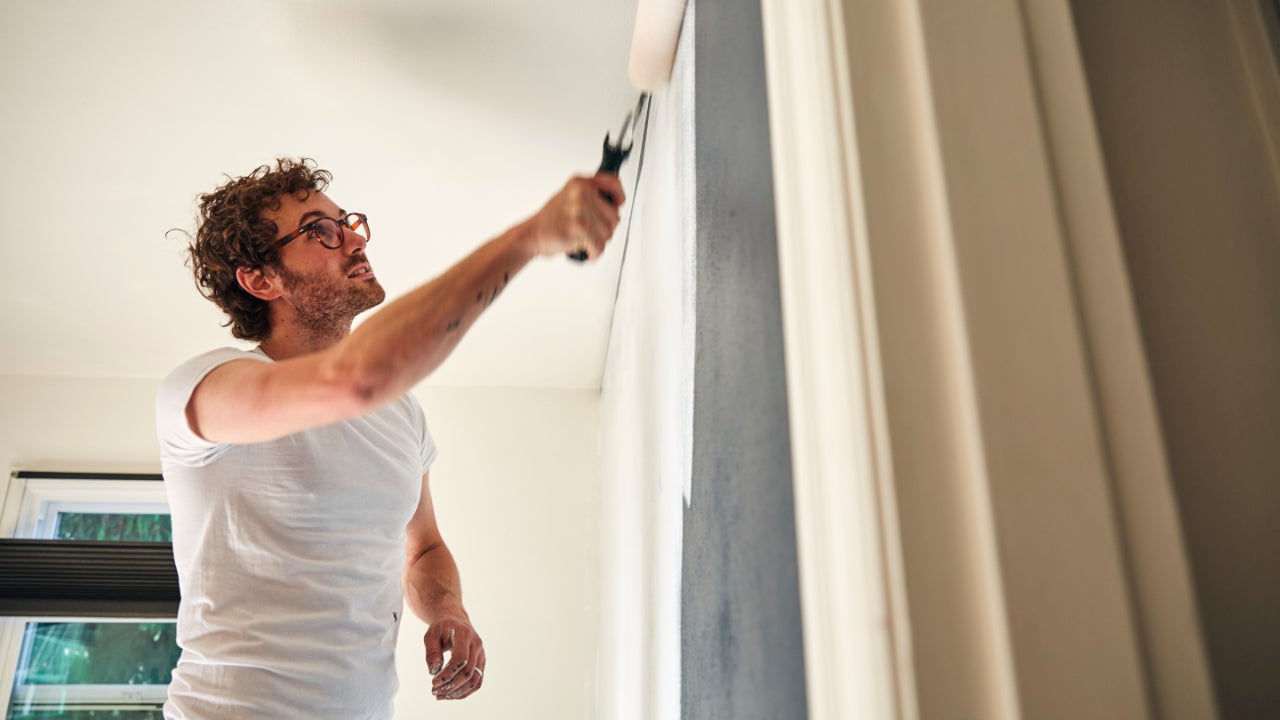5 key tips for buying a fixer-upper

Key takeaways
- Rehabbing a house looks easy on TV, but it can be time-consuming and expensive in real life.
- Budget carefully, expect the unexpected and know the limits of your skills.
- Several loan products can help you finance a home purchase and the renovations in one mortgage.
When Breanna Reish decided to buy a home back in 2009, she didn’t have a lot of extra cash on hand, so she looked at foreclosures. She found an older home that had been virtually stripped to the bone, but that didn’t deter her.
“We were left with a shell of a home that needed a ton of work, but we were able to lower the asking price down to $27,000,” says Reish, founder of the Riverside, California, financial planning firm Wealth of Confidence.
Although it took plenty of time and sweat equity, Reish says she’s happy with her fixer-upper. “We paid so little compared to what we would pay to live anywhere else,” she says. And the home has since appreciated in value — an added bonus.
What is a fixer-upper?
A fixer-upper is typically an older home that lacks curb appeal or modern updates and may require significant renovations. These homes are often located in a desirable neighborhood or school district, boosting their potential for rapid equity growth.
Since these properties need considerable work, prices on fixer-uppers are usually low, which means it’s possible to score a great deal (as Reish did). But the repairs can easily snowball, turning what was initially a bargain purchase into a potential money pit.
For that reason, buying a fixer-upper isn’t for the faint of heart. Many people dream of winding up with a home in their favorite neighborhood, renovated to fit their exact tastes, but these projects can come with a host of financial and logistical obstacles. However, if all goes well, the rewards can outweigh those challenges.
Who is a good candidate to buy a fixer-upper?
Some buyers may be uniquely suited to profiting from a fixer-upper purchase in the long term. These types of buyers include:
- Prospective homeowners who have a limited budget but the capacity or know-how to build sweat equity in their property
- Investors who are looking for property with a low price tag that has high potential based on budgeted upgrades, location, school district or other amenities
- Buyers looking to customize their home — fixer-uppers can provide a great canvas for the layout, fixtures and style of home you desire
Key tips for buying a fixer-upper
If you’re considering buying a fixer-upper, here are a few tips to consider.
1. Focus on location
While you can fix up a home, you can’t change its location. An ideal fixer-upper is in a desirable neighborhood that you love. If you dislike your surroundings or property values are struggling in the area, you might be left with buyer’s remorse. When looking for a fixer-upper, consider the neighborhood’s attributes, such as the school district, crime statistics and proximity to amenities like shopping, dining and parks.
“Seek the help of an experienced real estate agent to help you understand the neighborhood,” says Donovan Reynolds, an Atlanta real estate agent. Putting the work into a shabbier home in a sought-after neighborhood, he adds, means you get to “live in an area you might otherwise not have been able to afford.”
One of the best ways to find fixer-uppers is to drive around your desired neighborhoods and take note of any properties that appear to need repair or cosmetic attention. You can also keep an eye out online for listings that have been on the market for a long time or may be headed to auction soon. If you have the means to renovate, these homes have the potential to deliver strong investment returns.
Reynolds also suggests considering whether the renovations you plan on making will make sense for the area. “Pay attention to the after-renovation value (ARV), so you can estimate whether or not these improvements will give you a return on your investment (when you decide to sell),” he says. An experienced real estate agent can help you determine the ARV by comparing properties in the area.
2. Budget for the unexpected
When looking to buy a fixer-upper, it’s essential to have a plan going into the process. Renovating a home takes considerable time and money, and both budgets and timelines have been known to expand with this type of project. Reynolds suggests adding an extra 20 percent to your homebuying budget.
Although you might plan to do many of the repairs and renovations yourself, it’s best to hire a professional for important projects beyond your skill set, like electrical and plumbing work; you’ll want to incorporate that into your budget as well. For example, rewiring a house can cost upwards of $10,000.
Many contractors are backed up with projects, so it’s a good idea to line up professional work as far in advance as possible. When vetting contractors, search online reviews and consider their reputation for arriving on time and keeping projects on schedule and within budget. When you’re ready to hire contractors, ensure the contract contains a “time is of the essence” clause to help mitigate delays.
Mina Starsiak Hawk, half of the mother-daughter renovation duo on former HGTV series “Good Bones,” says preparing your mindset for inevitable issues is key. “Even in the best-case scenarios, there can be factors out of your control, like delays in city permits or repairs that come to a halt because of weather conditions,” Hawk says. “So when looking at fixer-uppers, approach it like there will be problems down the line.”
Another potential unforeseen circumstance: If you’re buying a foreclosure, the home could still be occupied — the eviction process, if necessary, can be costly and time-consuming.
3. Expect renovations to disrupt your life
With supply-chain issues, unexpected weather and other hiccups bound to happen, you can and should expect the project to take longer than you’d like. Consider your lifestyle: Do you intend to live in the home while it’s being renovated? If you work from home or have young children, for example, living in a home that’s under construction for several months might be a deal-breaker.
“Like the saying goes, the true test of any relationship is if you can live in a renovation together,” says Karen E. Laine, Hawk’s mother and co-star of “Good Bones.” “There are lots of things to consider, like your usual habits and standards of living. Think carefully about whether you can live without things, like a bathroom or a fully functioning kitchen, when you’re fixing up your home.”
If living through the hum of chainsaws and banging of hammers isn’t appealing, consider spreading out the remodeling projects over time to minimize the disruption.
4. Always get a home inspection
When you’re ready to make an offer, be sure to make it contingent on the results of a professional home inspection. Licensed inspectors can point out potential flaws or other critical issues that might cause serious problems later on.
“You want to have someone look at things like the overall structure of the home, crawlspaces, insulation and especially the foundation,” Hawk says. “If the property doesn’t have a good foundation, it can end up being a money pit.”
It’s also important not to let cosmetic flaws deter you from a home you otherwise love. Things like broken windows, peeling paint and outdated fixtures can be easily fixed. Instead, focus on the major components of a home so you can anticipate how much you might need to budget for serious structural or functionality repairs. Some things to pay close attention to include:
- Electrical, plumbing and sewer systems
- Foundation
- Air conditioning and heating (HVAC) systems
- Roofing
- Environmental issues
Do I need a specialized home inspection?
Depending on the condition of the home, you may want to consider a specialized inspection for a more detailed assessment. Here are a few additional services to consider:
- Pest inspection: If a home has sustained damage from pests like termites, ants or beetles, it can cause major headaches for you down the line.
- Sewer lines: Getting a sewer line scope and septic tank inspection can help you figure out whether they’re in need of repair or replacement, especially with older properties.
- Thermal imaging: With thermal imaging, a home inspector uses infrared light technology to identify potential issues that might not be apparent to the naked eye. This includes heat loss and air leakage, insufficient insulation, moisture damage and abnormal electrical components.
5. Find the right financing
Remodeling a fixer-upper can get pricey, so you’ll want to have the right kind of financing in place. Some home renovation mortgages even allow you to roll remodeling costs into your loan amount with a single mortgage loan— though there may be limitations on both your spending amount and your timeline. Here are a few options to consider:
Fannie Mae HomeStyle Renovation loan
Fannie Mae’s HomeStyle Renovation loan is a conventional mortgage that allows borrowers to purchase a home that requires repairs, with a single monthly payment and a single set of closing costs, rather than securing both a mortgage and a separate home improvement loan.
The HomeStyle Renovation loan gives prospective borrowers plenty of latitude: a maximum LTV of up to 97 percent, and renovation costs of up to 75 percent of the post-reno property value (calculated as the lower of either 75 percent of the purchase price plus renovation costs or 75 percent of the “as completed” appraised value). A credit score of at least 620 will ensure the best chance of lending approval.
The money for improvement projects goes into an escrow account that’s used to pay contractors directly, so you won’t have direct access to it. But this loan type does allow for use on all kinds of projects: from roofing to major landscaping projects to accessory dwelling units, borrowers can fund a number of the major expenses that may come with making a fixer-upper into a dream property.
Freddie Mac CHOICERenovation loan
CHOICERenovation is another conventional mortgage option that allows you to roll remodeling costs into a single-closing mortgage. It can be used for both fixed-rate and adjustable-rate loans.
An expansion program, the CHOICEReno eXPress mortgage, allows for smaller-scale improvements, like door and window replacements, through a similar loan process. For fixer-uppers in need of a more modest overhaul, the CHOICEReno eXPress loan may be a better option to consider.
While there is no minimum credit requirement or debt-to-income (DTI) ratio specified for either loan type, you’ll need to qualify for a conventional mortgage with your lender. For CHOICERenovation loans, lenders typically require a minimum credit score between 620 and 650 and a DTI of no greater than 50 percent.
FHA 203(k) loans
The Federal Housing Administration’s Section 203(k) loans also help prospective owners purchase a home and renovate it with one mortgage. There are two kinds: limited, which comes with a cap of $75,000 for repairs, and standard, which can fund a major rehab from $5,000 up. FHA loans generally have lower credit score and down payment requirements than conventional mortgages.
USDA renovation loans
The U.S. Department of Agriculture (USDA) offers two mortgage types — USDA Direct and USDA Guaranteed loans — that allow buyers to roll their purchase price and renovation costs into a single loan:
- Single Family Housing Direct Loans: Also referred to as Section 502 Direct Loans, these loans help qualified applicants purchase affordable property in a rural area by providing payment assistance. They are funded directly by the USDA.
- Single Family Housing Guaranteed Loan Program: This program — which is also known as the Section 502 Guaranteed Loan Program — similarly assists income-eligible applicants in securing and improving property in designated rural areas. These loans are funded by a private lender but up to 90 percent of the loan is guaranteed by the USDA.
VA renovation loan
Military borrowers and their spouses may be eligible for a no-down-payment renovation loan from the U.S. Department of Veterans Affairs. Borrowers can use a VA loan to purchase a home in need of repairs and improvements and build the cost of those projects into their loan amount. There are very specific limits, though, and it can’t be used for major structural work.
Bottom line
There is no such thing as the perfect fixer-upper — it’s a matter of finding one that’s perfect for you. Each property is different, and the choice depends on your budget, timeline and lifestyle. Be realistic about whether you’re ready to take on such a major project before taking the leap and buying a fixer-upper home.
Additional reporting by Sarah Li-Cain
Why we ask for feedback Your feedback helps us improve our content and services. It takes less than a minute to complete.
Your responses are anonymous and will only be used for improving our website.
You may also like

Cost to buy a house in Virginia

5 things to know about unsecured home improvement loans

How to choose a mortgage lender: 5 tips




